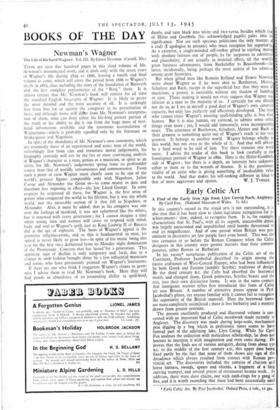BOOKS OF THE DAY
Newman's Wagner
The Life of Richard Wagner. Vol. III. By Ernest Newman. (Cassell. 30s.)
THERE are over five hundred pages in this third volume of Mr. Newman's monumental work, and it deals only with the seven years of Wagner's life during 1859 to 1866, leaving a fourth and final volume to come, which will cover the period from 1866 to Wagner's death in 1883,,thus including the story of the foundation of Bayreuth and the first complete performance of the " Ring " there. It is almost certain that Mr. Newman's book will remain for all time the standard English biography of Wagner. It is likely to prove the most detailed and the most accurate of all. It is strikingly free from bias for or against the composer in its presentation of facts, and although many will differ from Mr. Newman's interpreta- tion of them, none can deny either his life-long patient pursuit of the truth or his ability to dig it out from the huge mass of first- hand information available and the enormous accumulation of Wagneriana—which is probably equalled only by the literature on Shakespeare and Napoleon. In spite of the abundance of Mr. Newman's own comments, which are essentially those of an experienced and acute man of the world, refreshingly free from cant and immature moral judgements, his biography certainly will not be the last or most convincing analysis of Wagner's character as a man, genius as a musician, or spirit as an • artist, for Mr. Newman's judgements spring from no profounder source than that of worldly sensuousness and commonsense. Froth such a point of view Wagner must clearly seem to be one of the world's greatest figures comparable only with Napoleon, Julius Caesar and Alexander the Great or—to come nearer in date and therefore less imposing in effect—the late Lloyd George. In some respects he surpassed all these, for Wagner is the first artist of genius who conquered the world in his lifetime, but it was the whole world, not the miserable section of it that fell to Napoleon or Alexander. Also, it must he added, that as his conquest was one over the feelings of mankind, it was not ephemeral like the others, but is renewed with every generation ; for I cannot imagine a time when young men and women will cease to respond with mind, body and soul to Wagner's spell, just as King Ludwig II of Bavaria did at the age of eighteen. The basis of Wagner's appeal is the primitive religious-erotic, and as this is fundamental in man, his appeal is never likely to grow less—in spite of his music being this year for the first time dethroned from its Monday night domination of the Promenade Concerts that has lasted-for a generation. This apparent sign of decline is only temporary and local, due to a change in snob fashion brought about by a few influential musicians and artists who have persistently pointed out Wagner's limitations.
If there are any who think I exaggerate Wagner's claims to great- ness I advise them to read Mr. Newman's book. Here they will find proofs in abundance of an astounding ability to spell-bind, dazzle, and turn black into white and vice-versa, besides which that of Hitler and Goebbels (his acknowledged pupils) pales into in- significance. Nor are such specious politicians the only masters of a craft (I apologise to artisans) who must recognise his superiority, As a careerist, a single-minded self-seeker gifted in cajoling money with absolute fairness out of people, he far surpasses in adroitness and plausibility, if not actually in material effect, all the world's great business adventurers, from Rockefeller to Beaverbrook—the latter, incidentally, being perhaps the most ardent of his admirers among great financiers.
But when gifted men like Romain Rolland and Ernest Newman write about Wagner as if he were akin to Beethoven, Mozart, Schubert and Bach, except in the superficial fact that they were all musicians, a protest is inevitable without any shadow of humbug or cant. Those making it would not even suggest that Wagner was inferior as a man to the majority of us. I certainly for one shoulti not do so, as I see in myself a good deal of Wagner's own careerist capacity, but only less perfectly and effectively developed. The man who cannot enjoy Wagner's amazing spell-binding gifts is less than human. But it is also ,human, we contend, to admire some other things even more ; yes, I would add immensely, even incomparably more. The utterance of Beethoven, Schubert, Mozart and Bach at their greatest is something quite out of Wagner's reach at his very greatest. It belongs to another world. Wagner belongs wholly to this world, but not even to the whole of it. And that will always
be a final word to be said of him. Yet there remains one word more. I advise the reader of this book to look carefully at the frontispiece portrait of Wagner in 186o. Here is the Hitler-Goebbels
side of Wagner ; but there is a depth, an intensity here unknown either to them or to the wizards of finance. It is the passionate vitality of an artist who is giving something of incalculable value to the world. And that makes his self-seeking different in kind t.: that of mere aggressors and egoists. W. J. TURNER.


























 Previous page
Previous page